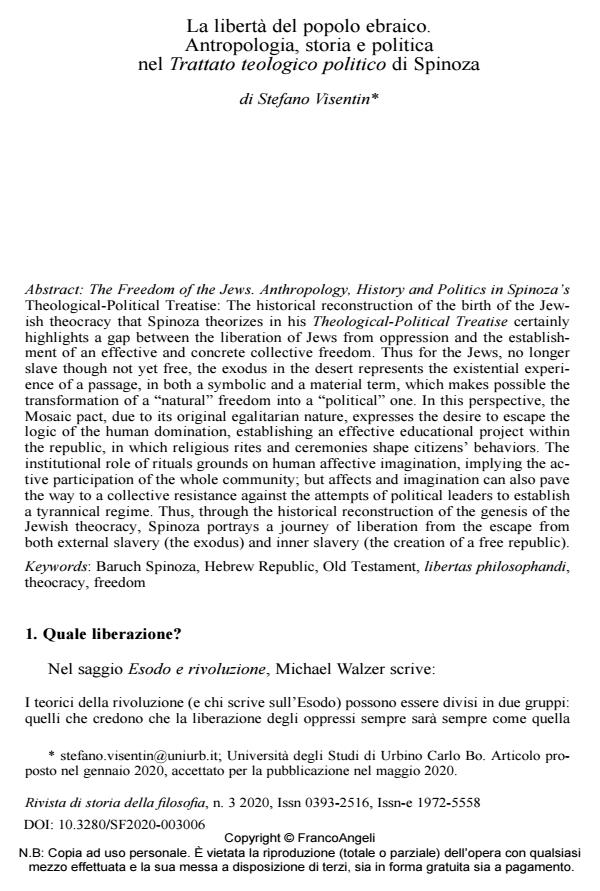La libertà del popolo ebraico. Antropologia, storia e politica nel Trattato teologico politico di Spinoza
Titolo Rivista RIVISTA DI STORIA DELLA FILOSOFIA
Autori/Curatori Stefano Visentin
Anno di pubblicazione 2020 Fascicolo 2020/3
Lingua Italiano Numero pagine 19 P. 485-503 Dimensione file 110 KB
DOI 10.3280/SF2020-003006
Il DOI è il codice a barre della proprietà intellettuale: per saperne di più
clicca qui
Qui sotto puoi vedere in anteprima la prima pagina di questo articolo.
Se questo articolo ti interessa, lo puoi acquistare (e scaricare in formato pdf) seguendo le facili indicazioni per acquistare il download credit. Acquista Download Credits per scaricare questo Articolo in formato PDF

FrancoAngeli è membro della Publishers International Linking Association, Inc (PILA)associazione indipendente e non profit per facilitare (attraverso i servizi tecnologici implementati da CrossRef.org) l’accesso degli studiosi ai contenuti digitali nelle pubblicazioni professionali e scientifiche
The historical reconstruction of the birth of the Jewish theocracy that Spinoza theorizes in his Theological-Political Treatise certainly highlights a gap between the liberation of Jews from oppression and the establishment of an effective and concrete collective freedom. Thus for the Jews, no longer slave though not yet free, the exodus in the desert represents the existential experience of a passage, in both a symbolic and a material term, which makes possible the transformation of a "natural" freedom into a "political" one. In this perspective, the Mosaic pact, due to its original egalitarian nature, expresses the desire to escape the logic of the human domination, establishing an effective educational project within the republic, in which religious rites and ceremonies shape citizens’ behaviors. The institutional role of rituals grounds on human affective imagination, implying the active participation of the whole community; but affects and imagination can also pave the way to a collective resistance against the attempts of political leaders to establish a tyrannical regime. Thus, through the historical reconstruction of the genesis of the Jewish theocracy, Spinoza portrays a journey of liberation from the escape from both external slavery (the exodus) and inner slavery (the creation of a free republic).
Parole chiave:Baruch Spinoza, Hebrew Republic, Old Testament, libertas philosophandi, theocracy, freedom
Stefano Visentin, La libertà del popolo ebraico. Antropologia, storia e politica nel Trattato teologico politico di Spinoza in "RIVISTA DI STORIA DELLA FILOSOFIA" 3/2020, pp 485-503, DOI: 10.3280/SF2020-003006